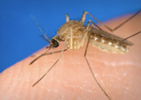Mosquitos and Disease
Mosquitos and Diseases
Click link for larger image

Photo Credit:
John Obermeyer
Viruses that are transmitted by mosquitoes and ticks are always more prevalent during late summer and especially during hot weather. Accordingly, mosquito testing by the Indiana Dept of Health is now reporting an increase in numbers of positive West Nile Virus infected mosquito populations throughout the state. This means that now is also the time to step up our vigilance to help protect against these serious diseases. We can do so by practicing and sharing the following.
Tips to help avoid mosquito-borne diseases and reduce mosquito populations
- Avoid being outdoors when mosquitoes are active (especially late afternoon, dusk to dawn and early morning);
- Apply an EPA-registered insect repellent containing DEET, picaridin, IR3535, oil of lemon eucalyptus or para-menthane-diol to clothes and exposed skin;
- Cover exposed skin by wearing a hat, long sleeves and long pants in places where mosquitoes are especially active, such as wooded areas;
- Install or repair screens on windows and doors to keep mosquitoes out of the home.
Even a container as small as a bottle cap can retain enough stagnant water to allow mosquitos to develop, so residents should take the following steps to eliminate potential breeding grounds:
- Discard old tires, tin cans, ceramic pots or other containers that can hold water;
- Repair failed septic systems;
- Drill holes in the bottom of recycling containers left outdoors;
- Keep grass cut and shrubbery trimmed;
- Clean clogged roof gutters, particularly if leaves tend to plug up the drains;
- Frequently replace the water in pet bowls;
- Flush ornamental fountains and birdbaths periodically; aerate ornamental pools, or stock them with predatory fish.
